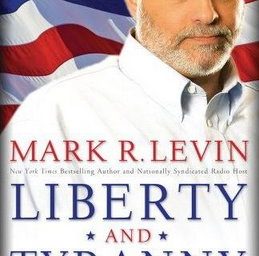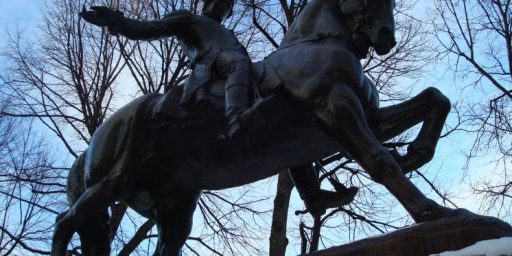So Much For Property Rights
I don’t know if James or somebody else has covered this, but I think it is important enough that if they have it should be covered again. Today was a black day for capitalism and our economy, IMO. Today is the day that the Supreme Court has seriously undermined the institution of property rights in this country.
WASHINGTON (AP) — — The Supreme Court on Thursday ruled that local governments may seize people’s homes and businesses — even against their will — for private economic development.
It was a decision fraught with huge implications for a country with many areas, particularly the rapidly growing urban and suburban areas, facing countervailing pressures of development and property ownership rights.
The 5-4 ruling represented a defeat for some Connecticut residents whose homes are slated for destruction to make room for an office complex. They argued that cities have no right to take their land except for projects with a clear public use, such as roads or schools, or to revitalize blighted areas.
I don’t think it is going to far to say that property rights is one of the major factors in the economic success of the U.S. The fact that the owner of property has rights to sell it, keep it, etc. makes economic transactions both easier and more certain. Think of it this way, you are thinking of buying a house, but now you have to not only consider things like the quality of house, the neighborhood, the schools, and financing, but whether or not some developer might come along, grease a few palms and get your house for only a fraction of what it is worth so they can build a strip center, a hotel or something else.
Now this certainty has been seriously undermined by the dimwits we have sitting on the Supreme Court. Here is another way of looking at the problem simply from the standpoint of the property owner’s welfare,
… the requirement to pay fair market value is a grossly inadequate safeguard on government power for two reasons in Kelo. First, it fails to take into account the subjective valuations placed on the property by people whose families have lived on the land, in at least one case, for a 100 years. In other words, if the Supreme Court rules for the city, the government will be able to seize land at a price considerably below the reservation price of the owners. Second, unlike the prototypical eminent domain case, in which the land is seized to build, say, a school or road, in this case the city is using eminent domain to seize property that will then be turned over to a private developer. If this new development increases the value of the property, all of that value will be captured by the new owner, rather than the forced sellers. As a result, the city will have made itself richer (through higher taxes), and the developer richer, while leaving the forced sellers poorer in both subjective and objective senses.
This is quite right. It is simply another form of rent-seeking. The current owners of the property have something that another entity wants so they use the political process to capture the increased value of the land. Here is a portion of Justice O’Connor’s dissent,
“Any property may now be taken for the benefit of another private party, but the fallout from this decision will not be random,” O’Connor wrote. “The beneficiaries are likely to be those citizens with disproportionate influence and power in the political process, including large corporations and development firms.”
O’Connor is basically pointing out the public choice/rent seeking problem inherent in this decision.
Strangely enough Prof. Volokh just doesn’t seem to get it in this case. Prof. Volokh seems to think that since the idea of having the government sieze private property and turn it over to a private company to run a store, hotel, etc. is better than having the government run the store, hotel, etc. that this decision is a good thing (note to self: If Prof. Volokh is ever nominated to the Supreme Court do whatever I can to fight his nomination tooth and nail). Prof. Volokh’s view that the dissenters in the case actually provide an incentive for cities to take property and start up businesses strikes me as rather…well…stupid. Exactly how many cities have actually done this, and done it successfully?
Will Collier also has a good observation on this,
The localities are still required to pay “a just price” when one of these takings occurs, but the price even a willing seller would be able to get from his property just took a huge hit. All a developer has to do now is make a lowball offer and threaten to involve a bought-and-paid-for politician to take the property away if the owner doesn’t acquiesce.
You can find the Kelo opinions here.






It’s a black day in America when private property rights are put at risk by crooked politicians and their crooked contributors.
Here’s the remedy: (short of Congressional action) make Eminent Domain takings political suicide. Any Republican who suggests such a project should lose all support from his state party. Any Democrat should be relentlessly targeted, with the Eminent Domain decision as a focus of the attacks. Dig deep into the financial records of the relevant politicians (and the businessmen who would benefit) and trumpet any unseemly connections.
Sounds like the perfect job for a blog.
Terrible thing has happened.
This approach to the rights of property
owners is the foundation for future
destruction of the country.
If anybody can reverse this decision –
please, do.
Look, Bush is creating a ownership society. Bush and his billionaire pals own our asses. Is anyone suprised by this?
First of all, It was the left wing extreme liberal judges that made this ruling, The right wing judges were not for this action.
Next, it is indeed a very sad day when our glorious Supreme Court put the screws to the average homeowner who has worked his life for a place to live that he can call his own. This ruling is a giant victory for city, county and state politicians who are on the take from greedy self serving lobiest and people with political clout.
Now is the time for Congress to get off their lazy name calling asses and take action against those on the court who made this decision.
IMPEACH SOME OF THOSE ASSHOLES.
What a load of crap considering that the majority vote came from the liberal wing of the SCOTUS, and the Bush had little if anything to do with it.
In short, get your head out of your butt anjin-san. Oh, and your pilot’s license has been revoked for wearing too large ideological blinders.
Well, since the Republicans control Congress, it should be no trouble to get an amendment through forbidding the taking of homes except for actual public use.
[Holds breath; dies.]
Anderson,
I hear ya’. Bush has shown himself to be a big government “conservative”.
Eminent Domain Abuse
Take some advice from the previous owners of this land: In the end, the only tribes that got treaties were the savage ones that fought hard and took scalps.
If you take this lying down, you’ll wind up extinct, or at least unrecognized, and without a reservation to call your own.
Sorry but I disagree with the CW on this. I don’t think this increases or decreases the likelihood that your property gets seized it just means that the property doesn’t have to get turned over to some gov’t agency. Say you have a highway reststop and property is taken by ED. Do you think that property should have to be owned by the state and leased to the user or do you think the user should be able to own it.
I live in an area where eminent domain will probably take my house. The supreme court has proven that power corrupts and absolute power corrupts absolutely
This is a horrible decision. Now, let’s look for a solution. Call, write, email your state and Federal congressmen and Senators demanding a new law to forbid the use of eminent domain for Private parties. I personally think ALL eminent domain is wrong, even for “public use”.
It is a sad day for our nation.
Bush had no part in the surpreme court decision, but don’t expect him to do anything in opposition to it. Bush himself became powerful through the state by seizing private property through eminent domain.
While Bush has claimed to be a strong advocate of property rights, he has proven to be a powerful agent in working against our freedoms, the most important of which includes the right to private ownership of property.
For those who would like something more actionable, following is a link to an online petition to impeach certain Supreme Court members.. the very ones who have voted in favor of private property condemnations…
http://www.PetitionOnline.com/lp001/